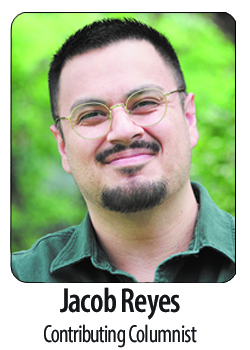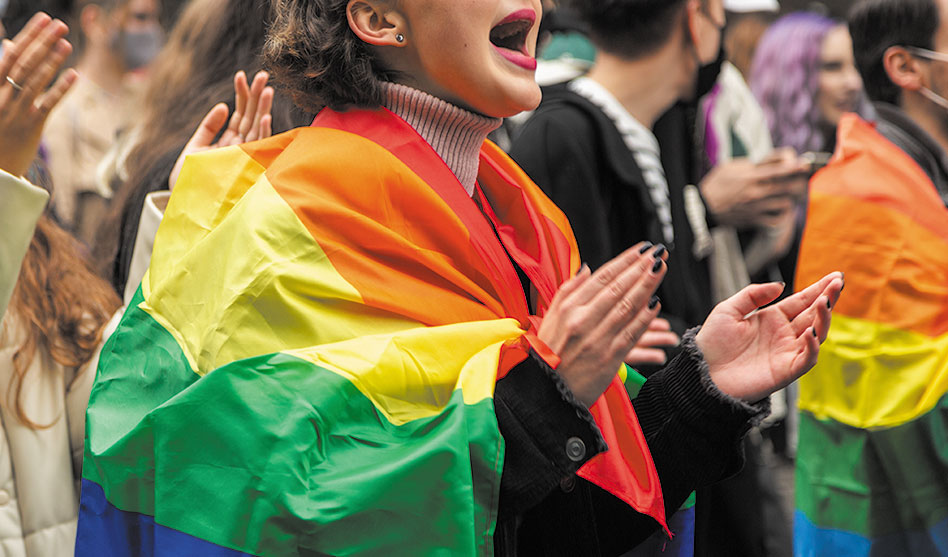LGBTQ students, faculty and allies will fight Texas SB 17 and other efforts to silence them
 Filed and approved last spring, Texas Senate Bill 17 on Jan. 1 this year. The law requires universities to close diversity, equity and inclusion offices and bans mandatory diversity training, diverse hiring initiatives, and more.
Filed and approved last spring, Texas Senate Bill 17 on Jan. 1 this year. The law requires universities to close diversity, equity and inclusion offices and bans mandatory diversity training, diverse hiring initiatives, and more.
As a result, LGBTQ-focused offices that provided health care for students, community-focused programming, counseling and additional resources, along with other essential programs, shuttered their official university operations by the end of last year.
The impact is harmful to all students. Instead of supporting the universities’ main mission — to be a universe of growth, learning and expansion — SB17 excludes, narrows and drags Texans backward.
To be a student with marginalized roots and identity often means arriving on campus more vulnerable than most. LGBTQ centers and programs encourage all students to feel welcomed and offer foundational support for success. Everyone in higher education needs initiatives, leaders and programs that recognize differences, encourage learning and expand the capacity for empathy and understanding.
This is the world many students are already living in and certainly what’s waiting for graduates, a world populated increasingly multicultural, multi-racial and out as LGBTQ people.
A record high 28 percent of GenZ is out as LGBTQ, the most racially- and ethnically-diverse generation in history. There is record-high agreement that LGBTQ should be free to live without discrimination.
But this rising visibility is not without risk, as evidenced by Texas lawmakers working overtime and across state lines to undermine equality and access. These efforts cut deeper at schools whose students are already at higher risk.
The University of Texas at Arlington’s LGBTQ program offered community to a largely unconventional campus. The university is one of the most diverse in the country, reflecting and supporting the Dallas/Fort Worth Metroplex’s population. It’s also a prominent commuter school that sees students outside of the typical age range; many are older and returning to school, while others are transfer students looking to steadily but surely, get that degree.
Here, too, the out queer student can be themselves. Bet cuts like SB17 add unnecessary and harmful barriers to belonging.
College should be a time for students to develop unique and clear perspectives about the world and forge bonds with friends and faculty.
Programs for students on the margins are designed to bring them closer to the center.
“The LGBTQ+ program was a beacon of safety and strength for UTA. I greatly admire the work our faculty has put into providing affirming spaces and representation for queer students,” recalled Jenna Schroeder, a UT Arlington student and president of Lavender Alliance, an LBGTQ-focused student organization.
“Attacks on DEI and the changes resulting from SB 17 are merely symptoms of an overwhelming hostility and intolerance that continues to [plague] our country,” Schroeder said. “For every two steps of progress made, we are forced to take one step back. When our legislation fails us, we as a people must work harder to support one another.”
The University of Texas, Texas A&M and other major public academic institutions across the state have also closed their official Diversity Equity and Inclusion offices, signaling an end to offering equity for marginalized students as the need grows.
According to the Williams Institute at the University of California at Los Angeles, 36 percent of adult LGBTQ folks live in the South, representing more than 5 million people. Those 5 million-plus Southerners continue to face discrimination in the form of legislation with a record-breaking number of anti-LGBTQ bills signed into law.
The setbacks have yet to push back students, though. They are now organizing and vocalizing their dissatisfaction with the university’s quiet shuttering of the LGBTQ office — refusing to go silent, to go back into the closet.
UT Arlington’s Progressive Student Union, a student-led organization, met with administrative officials recently to discuss their concerns over the end of the university’s LGBTQ center. Gone is the university’s official webpage for LGBTQ-specific resources like housing, medical treatment and mental health services. The university’s Pride Peer program, which created safe spaces and events for LGBTQ students, also was eliminated.
PSU member Justin Bent said they were underwhelmed by the meeting and said the university’s plan to integrate necessary resources for LGBTQ students into a new office, is a delayed response that requires immediate action. They are demanding that all students’ sources be available transparently and ensure quick access.
“What’s happening in Texas and other parts of the country is just part of a larger push by right-wing legislators to enact these changes on campuses and the larger society,” Bent said. “We are becoming more acceptable in society, so they are trying to restrict our ability to organize and be ourselves.”
The growth of our community is felt throughout, even through humble beginnings at a local North Texas campus. In 2018, a 26-year-old student walked onto the UT Arlington campus for the first time, hoping to finish his degree. It was the university’s LGBTQ program that gave him the courage to speak to others on campus and ignite a passion for human rights.
That student, now a graduate, full-time advocate and the writer of this column, continues that passion for the voices of many other folks who look and love just like him.
DEI initiatives give students of all backgrounds — and the university staff that supports them — resources and opportunities for all to thrive. To eliminate them is to dismiss us. And that is simply unacceptable.
We won’t go back.
“We will continue to be here,” Bent said. “We’re strong; we’re strong together. We’ve survived through these times and we will continue to be ourselves.”
Jacob Reyes is the news and rapid response coordinator for GLAAD, the Gay and Lesbian Alliance Against Defamation.


At public universities in Texas, students can form their own clubs. Students can get together and form a GLBT student organization. That is not prevented by SB17.
Anyone who believes that 28 percent of Generation Z is actually GLBT needs his or her head examined.
Goldie, if you were to ask a random group of GenZ students, you might be surprised to find that 28% is accurate, especially if you add the “Q” to the GLBT …… and if you add the “A” for Ally, LGBTQA+ might grow to over 73%. No need to take my word for it, ask GenZ members yourself